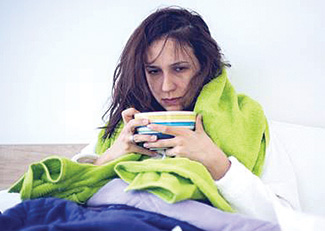Feed a cold, starve a fever?
 You’ve probably heard (and may even subscribe) to the well-known adage, “Feed a cold and starve a fever.” This mama medicine philosophy lives on, in part because many people have discovered anecdotally that food can in fact affect how your body prevents and recovers from illnesses like colds and viruses.
You’ve probably heard (and may even subscribe) to the well-known adage, “Feed a cold and starve a fever.” This mama medicine philosophy lives on, in part because many people have discovered anecdotally that food can in fact affect how your body prevents and recovers from illnesses like colds and viruses.
But is there actually science that links what you eat with these stay-in-bed-and-moan sicknesses?
“We cannot necessarily say that food choices can help make a cough disappear or ease a scratchy throat,” says wellness expert Michael Roizen, MD, author of the best-selling book What to Eat When. “But we shouldn’t diminish the fact that it can play a role in how you handle the random sicknesses that can get you from time to time.”
So, should you really feed a cold and starve a fever? Not necessarily. It’s worth noting, Dr. Roizen says, that the meals-as-medicine mantra is somewhat flawed in that a cold is an actual illness and a fever is a symptom. It’s sort of like comparing apples to oranges — both of which are fine illness fighters.
When you get a cold, you could be suffering from any number of symptoms (cough, congestion, runny nose, loss of appetite, even a fever). A fever itself, though, can be a symptom of any kind of infection that’s causing your immune system to fight whatever bacteria or viruses are invading.
Dr. Roizen says you should let your body — not a mantra — dictate some of your decision-making. Your immune system does need nutrients, so if you’re able to eat (and you feel like eating) you should get some calories in your body.
But if your symptoms are making you nauseated or you don’t have an appetite, you shouldn’t force it down.
No matter what, make sure you’re getting plenty of fluids because hydration is the key to bouncing back from an illness. You can easily get dehydrated from sweating and producing lots of mucus, and you need to make plenty of urine to clear the waste from your immune system.
Cleveland Clinic dietitian Andrea Dunn, RD, breaks down what foods to eat and drink when you’re feeling under the weather:
IF YOU’RE DEHYDRATED
- Drink liquids. It doesn’t matter if it’s hot, cold or room temperature – any type of liquid is going to help combat dehydration. Aim for water, electrolyte or sports drinks, coffee, teas, juice, soda or carbonated water.
- Have some soup. There’s a reason that chicken noodle soup is most people’s go-to when they don’t feel well. It’s typically more filling than plain water since it contains more calories, protein and vitamins. It’s also a good source of liquids and electrolytes. Soup in general can act as a natural decongestive when served hot.
- Eat foods that are mainly liquid like ice cream, popsicles, Jell-O and pudding.
- Fresh fruit contains many important vitamins, minerals and antioxidants that your body needs – even when you’re not sick. Aim for juicy fruits that are made up of mostly water, like melons, berries, oranges and grapes.
IF YOU HAVE DIARRHEA
Diarrhea is when food is moving too quickly through your body. You’ll want to focus on eating foods that can slow that process down, which means choosing foods that contain soluble fiber. This type of fiber acts as a thickening agent and adds form to the stool to help slow it down.
• Avoid or limit caffeine and sugar alcohols. Caffeine can overstimulate your digestive system and make diarrhea worse. Sugar alcohols don’t get absorbed in the gut and instead hang out in your large intestine, which can lead to bloating, stomach pain and more diarrhea.
• Eat bland foods. Very plain and bland foods can help ease symptoms. Try pasta, dry cereals, oatmeal, bread and crackers. Try eating rice and baked chicken breast or cheese and crackers.
• Eat fruits and vegetables. Try to add in boiled or baked potatoes, winter squash, baked apples, applesauce or bananas.
IF YOU’RE NAUSEOUS
- Try to eat every couple of hours, says Dunn. “Eating small amounts more frequently can help get a little food at a time into your system.”
- Ginger is well-known for its anti-nausea effects. Try ginger snaps, ginger ale, ginger tea or sucking on a few pieces of ginger candy. You can even try crystallized ginger, which is more soft and chewy and lightly coated in sugar.
- Nibble on a few pieces of dry foods every couple of hours when you’re battling nausea. Try pretzels, dry cereal, toast or plain crackers like saltines.
- Eat cold foods and foods with little odor. Because smells can trigger nausea (especially in pregnancy), cold foods might be a good choice. Try Jell-O, ice cream, frozen fruit, yogurt or popsicles. Even sucking on an ice cube is a good way to replenish fluids.
While no specific food can cure sickness, sometimes, eating the right thing can relieve symptoms and help you feel better. But keep in mind that what works for one person might not work for another. The best thing you can do when you don’t feel well is to focus on what helps you and what sounds appealing.


Leave a Reply